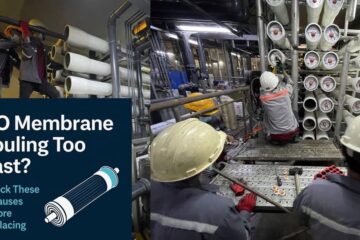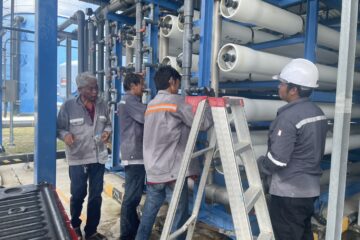
Antiscalants play a crucial role in maintaining the efficiency and longevity of water treatment systems, particularly in Reverse Osmosis (RO) and other membrane-based technologies. This article delves into the significance of antiscalants, drawing on research and published literature to highlight their impact on system performance and operational efficiency.
What Are Antiscalants?
Antiscalants are chemical additives designed to prevent the formation and deposition of scale on membranes and other components of water treatment systems. Scale formation occurs when dissolved salts precipitate out of solution and accumulate on surfaces, leading to reduced flow rates, increased energy consumption, and potential system failures.
Importance of Antiscalant Addition
- Prevention of Scaling
Scaling is a major problem in RO systems, particularly in areas with hard water or high concentrations of scaling-forming salts such as calcium carbonate, calcium sulfate, and barium sulfate. Antiscalants work by interfering with the crystallization process of these salts, preventing their precipitation and deposition on membrane surfaces. By doing so, they help maintain consistent flux rates and prevent the deterioration of membrane performance.
- Enhanced Membrane Performance
Scaling can significantly reduce the permeability of RO membranes, leading to lower water production rates and increased pressure requirements. Studies have shown that the use of antiscalants can improve membrane flux by reducing scaling-related fouling . This translates to more efficient water production and reduced operational costs.
- Extended Membrane Life
The accumulation of scale not only impacts performance but also accelerates membrane degradation. Antiscalants help in minimizing membrane fouling and scaling, thereby extending the operational life of membranes. Research indicates that effective use of antiscalants can reduce membrane replacement frequency and associated costs.
- Reduced Energy Consumption
Scaling increases the resistance to water flow, which in turn requires higher operating pressures to maintain the desired flow rates. This leads to increased energy consumption. By preventing scale formation, antiscalants help in maintaining lower operating pressures and thus reduce the overall energy costs associated with water treatment.
- Operational Stability
Consistent and reliable system performance is essential for effective water treatment. Scaling can lead to unexpected downtime and increased maintenance needs. Antiscalants contribute to operational stability by reducing the frequency of cleaning and maintenance interventions, ensuring smoother and more reliable system operation.
Types of Antiscalants
Antiscalants vary in their chemical composition and effectiveness. Common types include:
- Polyphosphates: Effective in sequestering calcium and magnesium ions, preventing scale formation.
- Organic Acids: Such as citric acid, which chelate calcium ions and prevent scaling.
- Organic Polymers: Including polyacrylic acid and maleic acid, which interfere with crystal growth.
Application and Dosage
The effectiveness of antiscalants depends on proper dosage and application. Factors such as water chemistry, temperature, and flow rates should be considered when determining the appropriate amount of antiscalant to use. Regular monitoring and adjustment of dosage are crucial to achieving optimal results.
Conclusion
The addition of antiscalants is essential for the efficient and cost-effective operation of water treatment systems. By preventing scaling, enhancing membrane performance, extending membrane life, reducing energy consumption, and ensuring operational stability, antiscalants play a vital role in maintaining system efficiency and reliability. Incorporating antiscalants into water treatment processes is a proven strategy supported by extensive research and industry practice.
ความสำคัญของการเติมสารป้องกันการเกิดสเกล (Antiscalant) ในระบบบำบัดน้ำ
บทนำ
การเติมสารป้องกันการเกิดสเกล (antiscalant) เป็นกระบวนการที่มีความสำคัญในการรักษาประสิทธิภาพและอายุการใช้งานของระบบบำบัดน้ำ โดยเฉพาะในระบบ Reverse Osmosis (RO) และเทคโนโลยีที่ใช้เมมเบรนอื่นๆ บทความนี้จะเจาะลึกถึงความสำคัญของสารป้องกันการเกิดสเกล โดยอิงจากงานวิจัยและหนังสือตีพิมพ์ เพื่อแสดงให้เห็นถึงผลกระทบที่มีต่อประสิทธิภาพของระบบและประสิทธิผลในการดำเนินงาน
สารป้องกันการเกิดสเกลคืออะไร?
สารป้องกันการเกิดสเกลคือสารเคมีที่ถูกออกแบบมาเพื่อป้องกันการเกิดและการสะสมของสเกลบนพื้นผิวของเมมเบรนและส่วนประกอบอื่นๆ ของระบบบำบัดน้ำ การเกิดสเกลเกิดขึ้นเมื่อเกลือที่ละลายอยู่ในน้ำตกตะกอนและสะสมบนพื้นผิว ทำให้เกิดการลดลงของอัตราการไหล เพิ่มการใช้พลังงาน และอาจทำให้ระบบล้มเหลว
ความสำคัญของการเติมสารป้องกันการเกิดสเกล
- การป้องกันการเกิดสเกล
การเกิดสเกลเป็นปัญหาสำคัญในระบบ RO โดยเฉพาะในพื้นที่ที่มีน้ำแข็งเกลือหรือมีความเข้มข้นสูงของเกลือที่ทำให้เกิดสเกล เช่น แคลเซียมคาร์บอเนต แคลเซียมซัลเฟต และแบเรียมซัลเฟต สารป้องกันการเกิดสเกลทำงานโดยการแทรกแซงกระบวนการผลึกของเกลือเหล่านี้ ซึ่งป้องกันไม่ให้เกิดการตกตะกอนและการสะสมบนพื้นผิวเมมเบรน (McGovern & Characklis, 2000) ทำให้การไหลของน้ำคงที่และป้องกันการเสื่อมสภาพของประสิทธิภาพของเมมเบรน
- การเพิ่มประสิทธิภาพของเมมเบรน
การเกิดสเกลสามารถลดความสามารถในการกรองของเมมเบรน ทำให้การผลิตน้ำลดลงและต้องใช้ความดันสูงขึ้น การศึกษาแสดงให้เห็นว่าการใช้สารป้องกันการเกิดสเกลสามารถเพิ่มอัตราการไหลของเมมเบรนโดยการลดการอุดตันจากการเกิดสเกล ซึ่งหมายถึงการผลิตน้ำที่มีประสิทธิภาพมากขึ้นและลดต้นทุนการดำเนินงาน
- การยืดอายุการใช้งานของเมมเบรน
การสะสมของสเกลไม่เพียงแต่ส่งผลต่อประสิทธิภาพ แต่ยังเร่งการเสื่อมสภาพของเมมเบรน การใช้สารป้องกันการเกิดสเกลช่วยในการลดการอุดตันและการสะสมของสเกล ทำให้สามารถยืดอายุการใช้งานของเมมเบรนได้ การวิจัยแสดงให้เห็นว่าการใช้สารป้องกันการเกิดสเกลอย่างมีประสิทธิภาพสามารถลดความถี่ในการเปลี่ยนเมมเบรนและค่าใช้จ่ายที่เกี่ยวข้อง
- การลดการใช้พลังงาน
การเกิดสเกลเพิ่มความต้านทานต่อการไหลของน้ำ ซึ่งต้องใช้ความดันสูงขึ้นในการรักษาอัตราการไหลที่ต้องการ ส่งผลให้การใช้พลังงานสูงขึ้น การป้องกันการเกิดสเกลช่วยในการรักษาความดันการทำงานให้ต่ำลง และลดต้นทุนพลังงานรวมที่เกี่ยวข้องกับการบำบัดน้ำ
- ความเสถียรในการดำเนินงาน
การดำเนินงานที่คงที่และเชื่อถือได้เป็นสิ่งสำคัญในการบำบัดน้ำ การเกิดสเกลสามารถทำให้เกิดการหยุดทำงานที่ไม่คาดคิดและความต้องการในการบำรุงรักษาที่เพิ่มขึ้น สารป้องกันการเกิดสเกลช่วยในการรักษาความเสถียรในการดำเนินงานโดยการลดความถี่ในการทำความสะอาดและการบำรุงรักษา ซึ่งทำให้การดำเนินงานราบรื่นและเชื่อถือได้มากขึ้น
ประเภทของสารป้องกันการเกิดสเกล
สารป้องกันการเกิดสเกลมีหลายประเภทและประสิทธิภาพแตกต่างกัน ตัวอย่างทั่วไปได้แก่:
- โพลีฟอสเฟต (Polyphosphates): มีประสิทธิภาพในการจับเกลือแคลเซียมและแมกนีเซียม ป้องกันการเกิดสเกล
- กรดอินทรีย์ (Organic Acids): เช่น กรดซิตริก (Citric Acid) ซึ่งจับเกลือแคลเซียมและป้องกันการเกิดสเกล
- พอลิเมอร์อินทรีย์ (Organic Polymers): รวมถึงกรดพอลิแอคริลิก (Polyacrylic Acid) และกรดมาเลอิก (Maleic Acid) ที่แทรกแซงการเจริญเติบโตของผลึก
การใช้และปริมาณที่เหมาะสม
ประสิทธิภาพของสารป้องกันการเกิดสเกลขึ้นอยู่กับปริมาณและการใช้งานที่เหมาะสม ปัจจัยต่างๆ เช่น เคมีของน้ำ อุณหภูมิ และอัตราการไหลควรได้รับการพิจารณาในการกำหนดปริมาณที่เหมาะสมของสารป้องกันการเกิดสเกล การติดตามและปรับปริมาณอย่างสม่ำเสมอเป็นสิ่งสำคัญในการบรรลุผลลัพธ์ที่ดีที่สุด
สรุป
การเติมสารป้องกันการเกิดสเกลมีความสำคัญอย่างยิ่งต่อการดำเนินงานที่มีประสิทธิภาพและคุ้มค่าในระบบบำบัดน้ำ โดยการป้องกันการเกิดสเกล การเพิ่มประสิทธิภาพของเมมเบรน การยืดอายุการใช้งาน การลดการใช้พลังงาน และการรักษาความเสถียรในการดำเนินงาน สารป้องกันการเกิดสเกลมีบทบาทสำคัญในการรักษาประสิทธิภาพและความเชื่อถือได้ของระบบ การใช้สารป้องกันการเกิดสเกลในกระบวนการบำบัดน้ำเป็นกลยุทธ์ที่ได้รับการพิสูจน์แล้วโดยการวิจัยและการปฏิบัติในอุตสาหกรรม
GET IN TOUCH



0 Comments